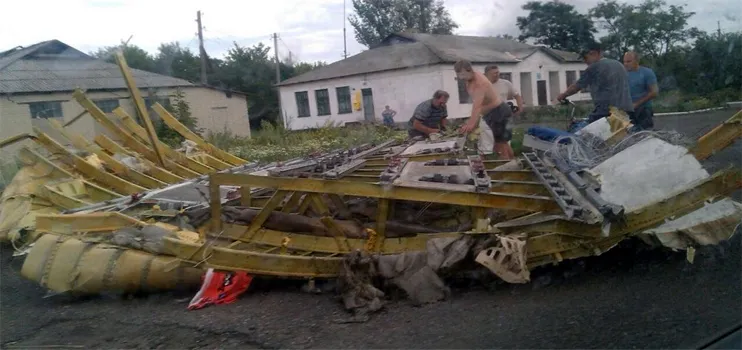
Pressure mounts on Russia over MH17 missile attack
May 26, 2018

International pressure is intensifying on Russia regarding its alleged involvement in the missile attack that downed Malaysia Airlines Flight MH17 in 2014. Recent investigations have linked the missile system used in the tragedy to Russian military units, prompting calls for accountability. Countries affected by the incident, along with human rights organizations, are demanding a thorough investigation and justice for the victims. As diplomatic tensions rise, Russia faces increasing scrutiny from the global community, which is urging for transparency and cooperation in addressing the tragedy, while Moscow continues to deny responsibility and reject the findings of international probes.
The tragic downing of Malaysia Airlines Flight MH17 in July 2014 continues to be a topic of international concern and investigation. As new evidence comes to light and geopolitical tensions rise, "pressure mounts on Russia" regarding its alleged involvement in the missile attack that led to the loss of 298 lives. This article delves into the unfolding events and the significance of this ongoing issue in the context of international relations.
Background of the MH17 Incident
MH17 was shot down over eastern Ukraine, an area embroiled in conflict between Ukrainian forces and pro-Russian separatists. Investigators concluded that the plane was hit by a surface-to-air missile known as a "Buk missile", which was reportedly transported from Russia into Ukraine. The incident has been a focal point of accusations against the Russian government, raising questions about accountability and justice.
Recent Developments in Investigations
In recent months, "international pressure" has intensified as new evidence and testimonies have emerged. The Joint Investigation Team (JIT), comprising several nations, continues to gather data to build a solid case against those responsible for the downing of MH17. Countries such as the Netherlands, Australia, and Malaysia have called for Russia to be held accountable for supplying the missile system.
One of the most significant developments was the release of satellite images and communications that allegedly link the missile system to Russian military units. This evidence has strengthened claims that Russia played a direct role in the attack. The following chart summarizes key findings from the investigations:
| Date | Event | Details |
|---|---|---|
| July 17, 2014 | MH17 Shot Down | Flight MH17 was hit by a missile over eastern Ukraine. |
| September 2016 | Initial Findings | JIT concluded that a Buk missile from Russia was used in the attack. |
| May 2018 | Identifying Suspects | JIT named four individuals linked to the Russian military as suspects. |
| June 2020 | Trial Commences | Trial of suspects begins in the Netherlands. |
| 2023 | Increased Sanctions | New sanctions imposed on Russian officials in response to findings. |
Geopolitical Implications
The "MH17 incident" has broader implications for international relations, particularly between Russia and the West. As the investigation continues, diplomatic tensions have escalated. The incident has been a rallying point for nations that seek to hold Russia accountable for its actions in Ukraine and beyond.
Western nations have responded to the findings with "sanctions" aimed at Russian officials and entities. These measures are designed not only to punish those directly involved in the incident but also to deter further aggression from Russia. Countries like the United States and members of the European Union have emphasized the importance of accountability in international conflicts.
Public Response and Global Awareness
The loss of MH17 deeply affected families around the world and sparked public outrage. Numerous memorials and campaigns have been initiated to honor the victims and press for justice. Social media has played a crucial role in raising awareness about the "MH17 tragedy", helping to keep the issue in the public eye.
Advocacy groups have emerged, demanding transparency and accountability from the Russian government. The push for justice has also led to discussions about the need for international bodies to strengthen their mechanisms for investigating such incidents. The importance of adhering to international law and protecting civilian lives in conflict zones has never been more apparent.
The Path Forward
As the JIT continues to work on the case, the hope for justice remains strong among the families of the victims. The possibility of bringing those responsible to trial could set a precedent for future accountability in international conflicts. The international community is watching closely, and the outcomes of this investigation will likely shape future relations between Russia and other nations.
In conclusion, as "pressure mounts on Russia" regarding the MH17 missile attack, the implications extend far beyond the tragedy itself. It serves as a reminder of the need for justice in the face of aggression and the importance of international cooperation in addressing such critical issues. The world continues to seek answers, and the fight for accountability remains ongoing.
Related Articles

Explore Thailand: The Best Islands to Visit for Paradise, Adventure, and Relaxation

The Ultimate Guide to the Best Islands in Thailand for Your Next Getaway

Do babies need passports? How to get a passport for a newborn

How to get a U.S. passport fast: here’s how to expedite the process

What is Mobile Passport Control: 5 reasons why you should use it

SENTRI vs. Global Entry: A detailed guide

Do you need a passport to go to the Bahamas? Let’s find out

Do you need a passport to go to Mexico? A detailed guide

Do you need a passport to go to Canada? We got the answer

Do You Need a Passport for a Cruise: An Essential Travel Guide

Booster Seat Requirements: All the Rules to Follow in Your Rental Car

What Are the World’s Most Powerful Passports, and How Does Yours Rank?

How to Take a Passport Photo at Home: A Helpful Guide

You've got to have heart! Southwest's new livery

Your opinion: Should water be free on low cost carriers?

Young women bolder than guys as solo travellers
